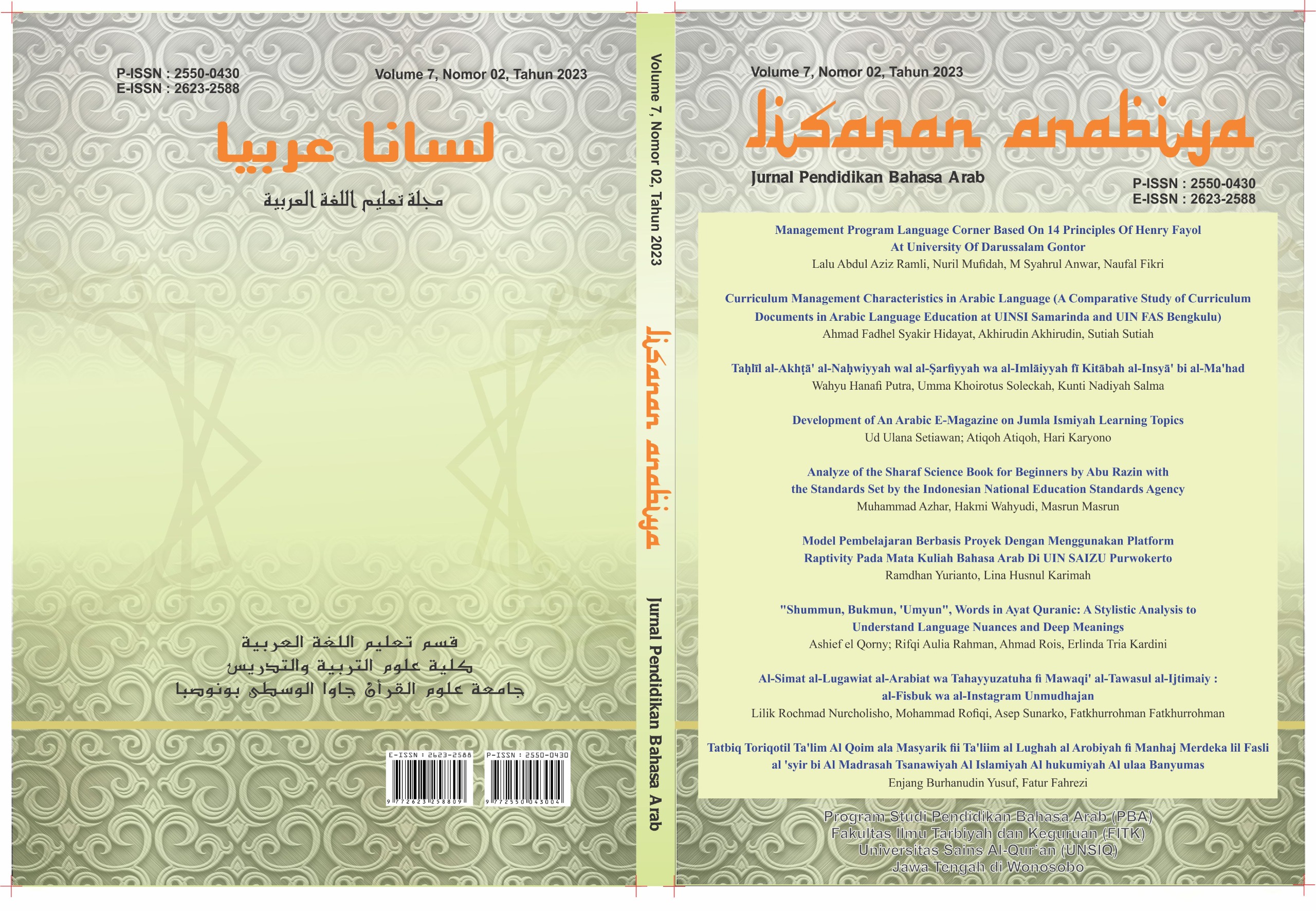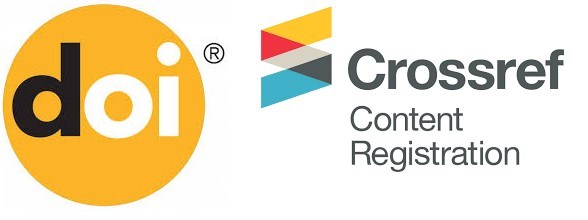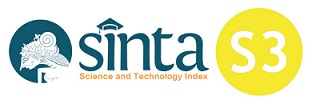Tatbiq Toriqotil Ta’lim Al Qoim ala Masyarik fii Ta’liim al Lughah al Arobiyah fi Manhaj Merdeka lil Fasli al ‘syir bi Al Madrasah Tsanawiyah Al Islamiyah Al hukumiyah Al ulaa Banyumas
Applying the project-based teaching method in teaching Arabic language in the Merdeka curriculum for the MAN 1 in Banyumas
DOI:
https://doi.org/10.32699/liar.v7i2.5866Keywords:
Project Based Learning, Arabic Language Learning, Independent CurriculumAbstract
The Project Based Learning method in the independent curriculum is a learning method that directly involves students in the learning process through research activities to work on and complete a particular learning project. the objectives of learning Arabic using the Project Based Learning method in the independent curriculum, which is to make every project undertaken by students in learning Arabic include and reach into P5 and P2RA. The problem formulation of this research is how to implement the Project Based Learning Method in learning Arabic in the independent curriculum in class X MAN 1 Banyumas and what types of projects are produced. The purpose of this study is to analyze and describe the implementation of the Project Based Learning Method in learning Arabic in the independent curriculum in class X MAN 1 Banyumas and to find and describe the types of projects produced. In this study, researchers used a qualitative approach by means of field research. The results showed that the implementation of the Project Based Learning Method in learning Arabic in the independent curriculum in class X MAN 1 Banyumas had gone quite well by going through 3 stages, namely the planning stage, the implementation stage and the evaluation stage. As for its application in learning Arabic with 6 steps covered in these 3 activities, including determining fundamental questions, designing or designing projects, preparing schedules for carrying out projects, monitoring projects, testing results, and the last is evaluating experience after working on projects and submitting projects. All types of projects that have been implemented in learning Arabic use paper media and have a positive effect on increasing student understanding.
References
إيـمان فتـحـي أحـمـد حـسـن و صديقه ,2019, مجلة كلية التربية بدمياط, تعليم منهج اللغة العربية باستخدام مدخل التعــلم بالمشــروع؛ لتنمية مهارات إنتاج اللغة، وبعض المهارات الجتماعية لدى تالميذا مرحلة الإعدادية.
فاتن عبد هللا زهران.( 2018.)استخدام مدخل التعلم القائم على المشروع في تنمية مهارات الكتابة والقراءة الناقدة باللغة اإلنجليزية، مجلة دارسات في المناهج وطرق التدريس، الجمعية المصرية للمناهج وطرق التدريس، كلية التربية، جامعة عين شمس،ع232 ،مارس.
فرح أولى النساء، 2021، رسالة الماجستير"تطبيق التعلم القاىٔم على المشروعات لمهارة القراءة في المدرسة المعارف ٧ يونان درجات الثانوية الإسلامية بلامونجان".، جامعة مولانا مالك إبراىيم الاسلامية الحكومية مالانج".
عبد العزيز الخضير, أ. (2022). تحديات التعلم القائم على المشاريع في تعليم الطالبات الصم وضعاف السمع بالمرحلة الثانوية. مجلة کلية التربية (أسيوط), 38(5.2), 44-83.
Pamessangi, A. A. (2020). تطبيق تعليم اللغة الجماعة في تعليم اللغة العربية. لسـانـنـا (LISANUNA): Jurnal Ilmu Bahasa Arab dan Pembelajarannya, 9(2), 299-308.
Afifah, N. R. (2023). Strategi Guru Dalam Menerapkan Kurikulum Merdeka Pada Pembelajaran Bahasa Arab Siswa Kelas VII SMP Unismuh Makassar. ULIL ALBAB”. . Jurnal Ilmiah Multidisiplin. Vol.2, No.7, 2664-2674.
Andriani, K. (2018). Urgensi Perencanaan Pembelajaran Bahasa Arab dalam Pendidikan di Sekolah. Prosiding Konferensi Nasional Bahasa arab, 4.
Dr. Halim Purnomo, M. P. (2019). Tutorial Pembelajaran Berbasis Proyek . Yogyakarta: K-Media.
Dr. Sandu Siyoto, S. M. (2015). Dasar Metodologi Penelitian . Sleman.
Dwi Nurani S. KM, M. S. (2022). Buku Serba Serbi Kurikulum Merdeka. BSKAP: Tim Pusat Kurikulum dan Pembelajaran (Puskurjar).
H. Haerullah, E. E. (2020). Dimensi Perkembangan Pendidikan Formal dan NonFormal. Jurnal Edukasi Nonformal E-ISSN : 2715-2634, 2.
Juhrani, M. (2022). Meningkatkan Ketrampilan Percakapan Bahasa Arab Melalui Model Pembelajaran Project Based Learning MTs Muhammadiyyah 3 Al- Furqon Banjarmasin. Jurnal Pendidikan, 3.
Mahyudin, A. F. (2012). Pembelajaran Bahasa Arab. Jakarta Pusat: Jakarta Pusat.
Mansyur, M. S. (2022). Reaktualisasi Model Project Based Learning Dalam Pembelajaran Pembelajaran Bahasa Arab. Tanfidziya: Journal of Arabic Education, 1(03)., 150.
Maruanaya, H. J. (2023). Desain Dan Penerapan Model Pembelajaran Berbasis Proyek Dalam Pembelajaran Bahasa. Arbitrer: Jurnal Pendidikan Bahasa Dan Sastra Indonesia. Universitas Pattimura, 801-818.
Mawardi, M. (2014). Pemberlakuan Kurikulum SD/MI Tahun 2013 dan Implikasinya Terhadap Upaya Memperbaiki Proses Pembelajaran Melalui PTK. Scholaria: Jurnal Pendidikan dan Kebudayaan, 4(3), 107-121, 117-118.
Muhammad, M. &. (2015). Pendekatan pembelajaran saintifik. Sidoarjo: Nizamia Learning Center.
Muin, A. F. (2022). Pengembangan Kurikulum Merdeka. CV. Literasi Nusantara Abadi.
Purnawanto, A. T. (2019.). Penerapan Metode Proyek dalam Pembelajaran PAI. Jurnal Pedagogy, 12(2).
Purwanto, P. S. (2015). Pembelajaran Pengelasan Las Busur Listrik Berbasis Project Based Learning untuk Meningkatkan Keterampilan Berpikir Kritis dan Hasil Belajar Siswa. Pendidikan Vokasi: Teori dan Praktek, 3(02)., 129.
Salamun, S. P. (2021). Inovasi Perencanaan Pembelajaran. Jakarta: Yayasan Kita Menulis, Cetakan 1.
Syukriya, A. U. (2019). Implementasi PjBL dengan media instagram pada keterampilan menulis bahasa Arab di SMA Islam PB Soedirman 1 Bekasi. Prosiding Konferensi Nasional Bahasa Arab, 5(5).
Tamaji, S. T. (2018). Manajemen Pembelajaran Bahasa Arab. Dar el-ilmi: Jurnal studi keagamaan, pendidikan, dan humaniora. Universitas Islam Darul Ulum, 107-122.
Umam, M. C. (2019). Implementasi Teori Belajar Humanistik Carl R. Rogers Pada Pembelajaran Pendidikan Agama Islam. . Tadrib, Vol. 5 No. 2 Desember. IAIN Salatiga, 6.
Yusuf, E. B. (2016). Kurikulum MKDU Bahasa Arab di PTKI Perspektif Arabic for Academic Purposes (AAP). Arabia: Jurnal Pendidikan Bahasa Arab, 2.
Downloads
Published
Issue
Section
License
Authors who publish with this journal agree to the following terms:
a. Authors retain copyright and grant the journal right of first publication with the work simultaneously licensed under a Creative Commons Attribution-ShareAlike 4.0 International License. that allows others to share the work with an acknowledgement of the work's authorship and initial publication in this journal.
b. Authors are able to enter into separate, additional contractual arrangements for the non-exclusive distribution of the journal's published version of the work (e.g., post it to an institutional repository or publish it in a book), with an acknowledgement of its initial publication in this journal.
c. Authors are permitted and encouraged to post their work online (e.g., in institutional repositories or on their website) prior to and during the submission process, as it can lead to productive exchanges, as well as earlier and greater citation of published work (See The Effect of Open Access).












